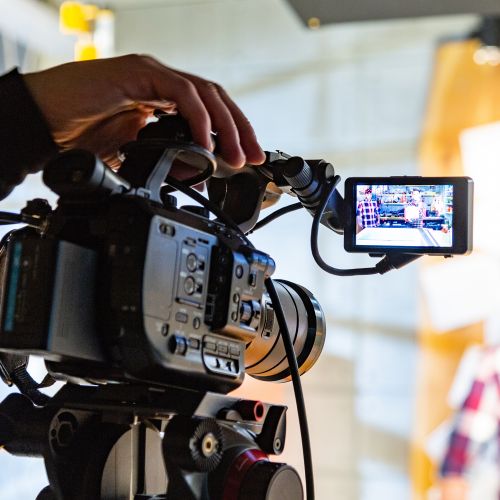The Duty of Legal Videography in Depositions and Tests
Legal videography has emerged as a necessary device in both depositions and tests, providing a multifaceted approach to recording witness testaments. As legal professionals increasingly acknowledge its worth, it prompts a deeper exam of how these visual documents can affect juror perceptions and trial outcomes.
Significance of Legal Videography
Legal videography plays a pivotal role in the documentation and presentation of depositions and tests. This specialized field integrates technical abilities with lawful expertise to develop a dependable record of process that can dramatically influence case results. The visual element of lawful videography boosts the understanding of witness testament, enabling jurors and judges to observe not just the spoken words yet likewise the attitude, emotions, and body language of the witnesses.

The relevance of lawful videography extends past the court; it likewise plays a vital duty in preserving proof for future reference, whether for appeals or further lawsuit. Because of this, its integration right into the legal procedure is important for guaranteeing a fair and precise representation of the truths, inevitably contributing to the quest of justice.

Process of Legal Videography
While capturing the subtleties of depositions and trials, the procedure of lawful videography includes numerous essential actions that make certain high-quality, accurate recordings. An expert legal videographer prepares by evaluating the case materials and understanding the details needs of the deposition or test. This prep work includes acquainting themselves with the participants and the context, which aids in recording significant details.
On the day of the recording, the videographer establishes up the needed equipment, which typically consists of high-definition cameras, microphones, and correct illumination. Guaranteeing optimum angles and audio high quality is crucial, as it directly affects the performance of the recording. The videographer interacts with lawyers and participants to establish procedures, ensuring that everyone recognizes the recording process.
Throughout the deposition or trial, the videographer meticulously records the process, paying very close attention to both spoken and non-verbal signs. legal videography. This includes catching the disposition and reactions of witnesses and lawyers. After the session ends, the videographer may edit the video for quality and conformity with legal criteria, generating a last product that accurately mirrors the proceedings for future referral and use in legal contexts
Benefits in Depositions
The consolidation of videography in depositions uses various benefits that enhance the overall procedure of collecting evidence. One primary advantage is the capacity to capture witness testaments with visual and auditory integrity, offering an extra accurate depiction of the witness's demeanor, tone, and body language. This multidimensional strategy allows lawyers and courts to assess integrity more successfully than standard written records alone.
Additionally, videographed depositions work as an effective device for preserving testimony. Should a witness come to be inaccessible for test, their tape-recorded deposition can be played in court, guaranteeing that their evidence stays obtainable and pertinent. This element substantially lowers the risk of losing important details that could impact case results.
Moreover, making use of lawful videography promotes better preparation for lawyers. Evaluating video clip footage permits legal teams to evaluate and fine-tune their methods, determining staminas and weaknesses in their instances. This primary benefit can cause even more engaging discussions in court.
Finally, videography improves the general professionalism of the deposition procedure, instilling self-confidence in clients pertaining to the thoroughness of their legal depiction. By leveraging technology, attorneys can substantially improve the efficiency of depositions.
Influence On Trials
In many tests, the assimilation of videography can significantly affect the presentation of evidence and the court's perception. Legal videography records witness testaments and important evidence in a dynamic format, allowing jurors to involve with the product on several degrees. This visual part boosts the narration element of a trial, offering context and psychological vibration that traditional text-based evidence might do not have.
Additionally, video recordings can serve as powerful devices for impeachment during cross-examination. When disparities arise in between a witness's previous statements and their court room statement, video clip Click This Link proof gives an objective reference that can sway jurors' viewpoints. This immediacy and quality can strengthen the reliability of a celebration's story while all at once threatening opposing debates.
In addition, the usage of videography can aid streamline complex information, making it more available to jurors who may battle to understand detailed details presented solely through verbal testimony. By combining visuals with auditory information, lawful videography can boost retention and understanding, inevitably affecting the court's decision-making process. Therefore, the effect of videography in tests prolongs past mere aesthetics; it plays an essential role in shaping the lawful landscape and end results.
Future Trends in Legal Videography
As official website we look toward the future of legal videography, a number of arising fads promise to reshape its function within the court. One substantial trend is the assimilation of expert system (AI) in video clip analysis and editing and enhancing - legal videography. AI can enhance the process of identifying essential moments in taped depositions, enabling lawyers to promptly access pertinent web content, therefore improving efficiency in case preparation
Furthermore, the surge of virtual truth (VIRTUAL REALITY) and boosted important source reality (AR) innovations is anticipated to change just how jurors experience proof. By immersing jurors in a simulated environment, these innovations can supply a much more extensive understanding of intricate circumstances, resulting in more informed considerations.

Moreover, the raising demand for remote depositions, accelerated by the COVID-19 pandemic, will likely proceed. Lawful videographers will certainly need to adapt to new software and systems to make certain high-grade recordings in digital setups.
Finally, the growing focus on information safety will certainly require more stringent protocols for keeping and sharing video clip evidence. As the legal landscape evolves, lawful videographers need to stay abreast of these fads to preserve their significance and effectiveness in the judicial procedure.

Conclusion
In recap, lawful videography serves a vital feature in the judicial procedure, improving the integrity of depositions and trials. By capturing the subtleties of witness testaments, this tool not only preserves important proof but likewise help in presenting information properly to jurors. The relevance of aesthetic paperwork in assessing reliability and facilitating interrogation can not be overemphasized. As modern technology continues to progress, lawful videography is positioned to additional transform its duty within the lawful landscape.